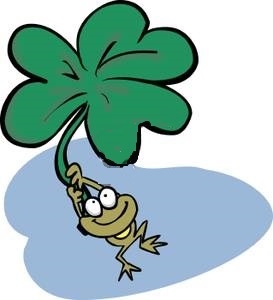"Irwin, my boy, many an opportunity is lost because the frog is out looking for four-leaf clovers," said Dharma. "Rather," he continued, "it's far better to look for opportunities right here, right now...within yourself. You can't rely on blind luck to give you the life you want." I sensed that he was right, he always is, but I wasn't just sure why. But soon enough, I had my answer.
Years ago, Dharma explained, hard work equated success. Recently, though, faith in luck has superseded the notion of creating our own luck. It seems that the main function of luck is hope. But hope, that feeling of expectation and desire for a certain thing to happen, is within each one of us...whether or not we believe in luck. Hope can be synonymous with self- confidence; that inner knowing that we have all we need to succeed. "Why then," asked Dharma, "would any human or frog need to trust in luck? Isn't is better to trust in yourself?" It was an excellent question to ponder.
Many humans consider themselves lucky, while many more consider themselves unlucky. Confident people attribute success to themselves and failure to bad luck or themselves...i.e. "I didn't work hard enough" or "I didn't study properly." This line of thinking is empowering and builds self-esteem. Those who attribute their success to luck and their failures to themselves..those who wait for luck to "strike them," will eventually become insecure. "Will it happen or won't it happen?" Thinking like this can, and will, make one crazy. We feel powerless and without autonomy. And those attributes only serve to make us feel small and weak. Many studies on the subject of luck have been conducted and they've all proven several points; that "lucky" people do seem to have more good things happen to them than those who consider themselves unlucky. And, it wasn't luck that caused the good. "Lucky" people tend to be more extroverted and open to others. They are are twice as likely to smile and engage in eye contact than those who deemed themselves "unlucky." Why? Because, according to Dharma, they maximized the probability of having positive opportunities. Unlucky humans will meet and speak less to people which greatly reduces their probability of having positive outcomes. You've probably seen this in action. Take a work-related dinner party, for example. Several employees are there, along with the boss. The employee who engages the boss in dinner conversation will be remembered when a promotion comes up. The meeker employee might be far more capable, but without the interaction of pleasant conversation, the boss will have difficulty remembering him. it's a classic case of "the squeaky wheel gets the oil."
Luck, you could say, is determined by your state of mind and the way that you engage the world. Being open and interactive, and being able to detect opportunities, gives you a competitive edge. If you see yourself as "unlucky" you might try looking at your behaviors and attitudes. Are you the "bell of the ball" or are you a "wallflower"? A few minor tweaks in the way we interact with others can make all the difference. So, instead of hoping to find that lucky four-leaf clover, the one that will make your dreams magically come true, why not spend your energy looking for opportunities in the here and now. And don't be afraid to speak up and ask for what you want...or need. Frogs aren't much in the way of mind readers and, so I gather, neither are humans. No one but you knows what you want. So go ahead, speak up. Talk to others. Look for those golden opportunities. They're right there in front of you if you bring your attention a little closer to home. Leave the clover to the rabbits. Otherwise, you could be waiting a long time for Lady Luck to appear. And we all know how fickle she can be.

 RSS Feed
RSS Feed